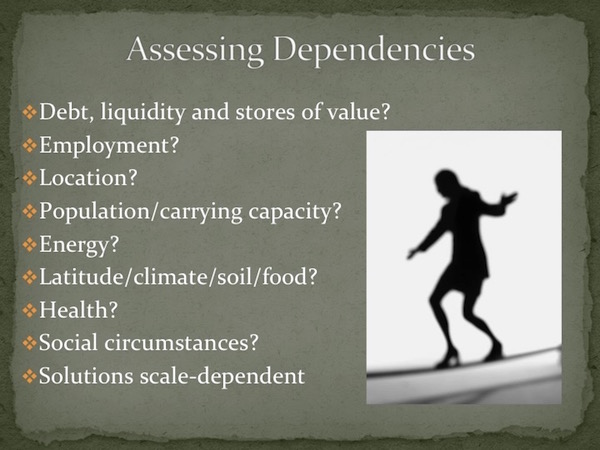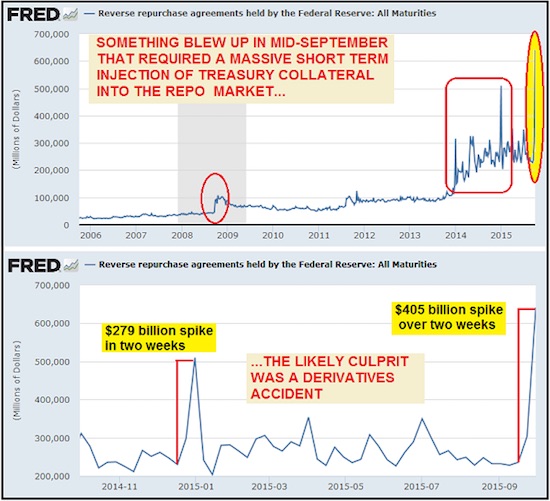Home » Posts tagged 'the automatic earth' (Page 12)
Tag Archives: the automatic earth
Toxic Wheat, GMOs and the Precautionary Principle

Ben Shahn Daughter of Virgil Thaxton, farmer, near Mechanicsburg, Ohio 1938
But first I would like to touch on a closely connected issue, which is Nassim Nicholas Taleb’s ‘war’ on GMOs. Taleb, of Black Swans fame, has been at it for a while, but he’s stepped up his efforts off late.
In 2014, with co-authors Rupert Read, Raphael Douady, Joseph Norman and Yaneer Bar-Yam, he published The Precautionary Principle (with Application to the Genetic Modification of Organisms), an attempt to look at GMOs through a ‘solidly scientific’ prism of probability and complex systems. From the abstract:
The precautionary principle (PP) states that if an action or policy has a suspected risk of causing severe harm to the public domain (affecting general health or the environment globally), the action should not be taken in the absence of scientific near-certainty about its safety. Under these conditions, the burden of proof about absence of harm falls on those proposing an action, not those opposing it. PP is intended to deal with uncertainty and risk in cases where the absence of evidence and the incompleteness of scientific knowledge carries profound implications and in the presence of risks of “black swans”, unforeseen and unforeseable events of extreme consequence.
[..] We believe that the PP should be evoked only in extreme situations: when the potential harm is systemic (rather than localized) and the consequences can involve total irreversible ruin, such as the extinction of human beings or all life on the planet.
…click on the above link to read the rest of the article…
Climate, Energy, Economy: Pick Two

Dorothea Lange Miserable poverty. Elm Grove, Oklahoma County, OK 1936
Not the exact same, but similar, just a bit more complicated. You can’t have your climate nice and ‘moderate’, your energy cheap and clean, and your economy humming along just fine all at the same time. You need to make choices. That’s easy to understand.
Where it gets harder is here: if you pick energy and economy as your focus, the climate suffers (for climate you can equally read ‘the planet’, or ‘the ecosystem’). Focus on climate and energy, and the economy plunges. So far so ‘good’.
But when you emphasize climate and economy, you get stuck. There is no way the two can be ‘saved’ with our present use of fossil fuels, and our highly complex economic systems cannot run on renewables (for one thing, the EROEI is not nearly good enough).
It therefore looks like focusing on climate and economy is a dead end. It’s either/or. Something will have to give, and moreover, many things already have. Better be ahead of the game if you don’t want to be surprised by these things. Be resilient.
But this is Nelson’s piece, not mine. The core of his argument is worth remembering:
“Everything that is not resilient to high energy prices and extreme weather events will become economically unviable…
…and approach worthlessness. On the other hand,…
Investments of time, energy, and money in resilience will become more economically valuable…“
…click on the above link to read the rest of the article…
Deflation Is Blowing In On An Eastern Trade Wind
Brexit is nowhere near the biggest challenge to western economies. And not just because it has devolved into a two-bit theater piece. Though we should not forget the value of that development: it lays bare the real Albion and the power hunger of its supposed leaders. From xenophobia and racism on the streets, to back-stabbing in dimly lit smoky backrooms, there’s not a states(wo)man in sight, and none will be forthcoming. Only sell-outs need apply.
The only person with an ounce of integrity left is Jeremy Corbyn, but his Labour party is dead, which is why he must fight off an entire horde of zombies. Unless Corbyn leaves labour and starts Podemos UK, he’s gone too. The current infighting on both the left and right means there is a unique window for something new, but Brits love what they think are their traditions, plus Corbyn has been Labour all his life, and he just won’t see it.
The main threat inside the EU isn’t Brexit either. It’s Italy. Whose banks sit on over 30% of all eurozone non-performing loans, while its GDP is about 10% of EU GDP. How they would defend it I don’t know, they’re probably counting on not having to, but Juncker and Tusk’s European Commission has apparently approved a scheme worth €150 billion that will allow these banks to issue quasi-sovereign bonds when they come under attack. An attack that is now even more guaranteed to occcur than before.
Still, none of Europe’s internal affairs have anything on what’s coming in from the east. Reading between the lines of Japan’s Tankan survey numbers there is only one possible conclusion: the ongoing and ever more costly utter failure of Abenomics continues unabated.
…click on the above link to read the rest of the article…
Brexit: Wrong Discussion, Wrong People, Wrong Arguments

G.G. Bain Immigrants arriving at Ellis Island, New York 1907
But I think both also miss out on the main reason why these ‘demises’ are happening. In my view, it’s not enough, not satisfactory, to talk about disgruntled voters and corrupt politicians and the antics of Donaldo, and leave it at that. There is something bigger, much bigger, going on that drives these events.
But that I will explain in a later article (soon!). Right now, I want to address another piece of the same pie (though it’s perhaps not obvious that it is): the Brexit ‘discussion’ in Europe. A May 11 piece by ex-World Banker Peter Koenig provides as good a starting point as any:
The Collapse of the European Union: Return to National Sovereignty and to Happy Europeans?
Imagine – the EU were to collapse tomorrow – or any day soon for that matter. Europeans would dance in the streets. The EU has become a sheer pothole of fear and terror: Economic sanctions – punishment, mounting militarization, the abolition of civil rights for most Europeans.
…click on the above link to read the rest of the article…
CERN Discovers New Particle Called The FERIR
CERN Discovers New Particle Called The FERIR
This is an article by our friend Steve Keen, which was yanked by Forbes yesterday after just a few hours due to, according to Steve, their ‘parody policy’. I did some research and it turns out the Automatic Earth has no such policy. So I offered Steve to repost it here.
Steve Keen: CERN has just announced the discovery of a new particle, called the “FERIR”.
This is not a fundamental particle of matter like the Higgs Boson, but an invention of economists. CERN in this instance stands not for the famous particle accelerator straddling the French and Swiss borders, but for an economic research lab at MIT—whose initials are coincidentally the same as those of its far more famous cousin.
Despite its relative anonymity, MIT’s CERN is far more important than its physical namesake. The latter merely informs us about the fundamental nature of the universe. MIT’s CERN, on the other hand, shapes our lives today, because the discoveries it makes dramatically affect economic policy.
CERN, which in this case stands for “Crazy Economic Rationalizations for aNomalies”, has discovered many important sub-economic particles in the past, with its most famous discovery to date being the NAIRU, or “Non-Accelerating Inflation Rate of Unemployment”. Today’s newly discovered particle, the FERIR, or “Full Employment Real Interest Rate”, is the anti-particle of the NAIRU.
Its existence was first mooted some 30 months ago by Professor Larry Summers at the 2013 IMF Research Conference. The existence of the FERIR was confirmed just this week by CERN’s particle equilibrator, the DSGEin.
Asked why the discovery had occurred now, Professor Krugman explained that ever since the GFC (“Global Financial Crisis”), economists had been attempting to understand not only how the GFC happened, but also why its aftermath has been what Professor Summers characterized as “Secular Stagnation”.
…click on the above link to read the rest of the article…
Why We Are So Bad at Solving Problems

And only then I saw that what they had read, which was published May 2, 2015 as Quote Of The Year. And The Next. And The One After, was actually largely a rerun of a January 1 2013 article. But, you know, when someone tells you “Your essay is excellent. And as one who has been closely attuned to such matters for nearly 50 years I can say with confidence that your theme is fresh and current as any other we should be reading and heeding today. In fact, I think it is timeless.”, A) you feel young, and B) you say: who am I to disagree with that?
So this today went up at OpEdNews.com, and is now once again up at The Automatic Earth as well. Because I do still think it’s relevant and important to acknowledge that “we are going to evolve through crisis, not through proactive change.”, and that we are nowhere near realizing how true that is, and how much that denial, unfortunately, guides our existence. We’re either not even smart monkeys, or we’re that at best. We need a lot more self-reflection than we are getting, or we’re going down. And my bet, much as it pains me, is on door no. 2. From May 5, 2015:
…click on the above link to read the rest of the article…
Is China About To Drop A Devaluation Bomb?
Though she had no intention of being funny, we laughed out loud, as undoubtedly many did with us, when incumbent and wannabe IMF head Christine Lagarde said last week in Davos that China has a communication issue. Of course, Lagarde knows full well that Beijing has much bigger problems than communication ‘with the market’. Or, to put it differently, if Xi and Li et al would ‘improve’ their communication by telling the truth about their economy, nobody would be talking about communication anymore.
Mixed signals from China, which is attempting to shift its economy away from exports and investment to a consumer-driven model, have deepened concerns about the outlook for world growth, she said. Uncertainty is “something that markets do not like”, Ms Lagarde told a panel of business leaders and economic regulators in the snow-blanketed Swiss ski resort. Investors have struggled with “not knowing exactly what the policy is, not knowing exactly against what the renminbi is going to be valued”, she said, referring to China’s currency. “I think better and more communication will certainly serve that transition better.”
The world’s second-largest economy this week announced its 2015 GDP growth as 6.9%, its slowest in a quarter of a century. The figure cast a shadow over the summit, where IHS chief economist Nariman Behravesh told AFP that Chinese policymakers had “fumbled” and had “added to the uncertainty and the volatility by their behaviour”. Mr Fang Xinghai, the vice-chairman of China’s securities regulator, said at the same panel that “in terms of communication, we should do a better job”. “We have to be patient because our system is not structured in a way that is able to communicate seamlessly with the market,” he added.
…click on the above link to read the rest of the article…
Nicole Foss presents: Challenge and Choices
Nicole Foss presents: Challenge and Choices
Nicole Foss: After more than 30 years of exponential growth, gargantuan resource demand and increasingly frenetic consumption, we have now reached, or are reaching, an array of limits to growth. During our long, debt-fuelled boom, we reached out spatially through globalisation to monetise as much global production as possible, in order to facilitate the efficient transfer of wealth from the global periphery to its economic heartland.
We also, through the profligate use of credit and debt, reached forward in time to borrow from the future in order to stage an orgy of consumption in the present. This spectacularly successful modern form of economic imperialism delivered unprecedented wealth concentration, the like of which previous imperial structures could not have dreamed of attaining.
We are facing limits in terms of finance, energy, water, soil fertility, food web integrity on both land and sea, biodiversity, carrying capacity and the environment’s ability to absorb waste streams, among others. All of these factors, and the interactions between them, constitute parts of the reality jigsaw which we have been developing here at the Automatic Earth for the past eight years. Although we focus primarily on finance, as this is the first limit many will face, all limiting factors, and their relative timeframes, are vital to an understanding of the way the next several decades can be expected to play out.
This understanding of the big picture is crucial, but even more important is the ability to apply the knowledge in practice. This involves working through a complex decision tree process, spanning the assessment of strengths, weaknesses, opportunities, vulnerabilities and potential courses of action at different scales, from the individual to the regional. Our latest Automatic Earth video offering – Challenge and Choices – is designed to offer guidance in working through this process.

…click on the above link to read the rest of the article…
Everything’s Deflating And Nobody Seems To Notice
Everything’s Deflating And Nobody Seems To Notice
Whenever we at the Automatic Earth explain, as we must have done at least a hundred times in our existence, that, and why, we refuse to define inflation and deflation as rising or falling prices (only), we always get a lot of comments and reactions implying that people either don’t understand why, or they think it’s silly to use a definition that nobody else seems to use.
-More or less- recent events, though, show us once more why we’re right to insist on inflation being defined in terms of the interaction of money-plus-credit supply with money velocity (aka spending). We’re right because the price rises/falls we see today are but a delayed, lagging, consequence of what deflation truly is, they are not deflation itself. Deflation itself has long begun, but because of confusing -if not conflicting- definitions, hardly a soul recognizes it for what it is.
Moreover, the role the money supply plays in that interaction gets smaller, fast, as debt, in the guise of overindebtedness, forces various players in the global economy, from consumers to companies to governments, to cut down on spending, and heavily. We are as we speak witnessing a momentous debt deleveraging, or debt deflation, in real time, even if prices don’t yet reflect that. Consumer prices truly are but lagging indicators.
The overarching problem with all this is that if you look just at -consumer- price movements to define inflation or deflation, you will find it impossible to understand what goes on. First, if you wait until prices fall to recognize deflation, you will tend to ignore the deflationary moves that are already underway but have not yet caused prices to drop. Second, when prices finally start falling, you will have missed out on the reason why they do, because that reason has started to build way before a price fall.
…click on the above link to read the rest of the article…
Nicole Foss Podcast: The Age of Limits
Nicole Foss Podcast: The Age of Limits
The Automatic Earth’s Nicole Foss recorded a podcast yesterday with Jack Spirko at the Survival Podcast. I haven’t even had time to listen to it yet, but I’m sure it’ll be as lightheartedly entertaining as her appearances always tend to be ;-). One thing I did notice is that for the first 13 minutes or so, there is no Nicole, just talk about sponsors of the Survival podcast. So you might want to skip that. Enjoy!


 Episode-1660- Nicole Foss on Liquidity Crunch and Economic Depression [1:37:01]
Episode-1660- Nicole Foss on Liquidity Crunch and Economic Depression [1:37:01]


Special Notice – In the interest of journalistic integrity I feel obligated to reveal something that occurred today. Skype screwed up and only Nicole’s side of the interview came out in the end. Luckily she is a talker and I didn’t say much in this interview. To make it functional for the audience I went though a re recorded my side and pieced the entire thing together. It came out really well but if anything seems missing this is why. Likely if I didn’t tell you you would never even know that my side wasn’t live…
Join Me Today to Hear Nicole Discuss…
• What is the Age of Limits
• The coming liquidity crunch and economic depression
• Some reasons taking out a mortgage may not be a good idea
• What this means for small farms in regard to debt
• How and why population will most likely be reduced
• Why we should not even focus on climate change as a problem
• What do you recommend for the average 9-5er should do
• How much longer can we kick the can down the road
• Nicole’s predictions for how the world wide economic crisis will play out
• Thought on a possible mass migration in the US
Short Squeeze, Liquidity, Margin Debt and Deflation
Short Squeeze, Liquidity, Margin Debt and Deflation
Some things you CAN see coming, in life and certainly in finance. Quite a few things, actually. Once you understand we’re on a long term downward path, also both in life and in finance, and you’re not exclusively looking at short term gains, it all sort of falls into place. The only remaining issue then is that so many of you DO look at short term gains only. Thing is, there’s no way out of this thing but down, way down.
Yeah, stock markets went up quite a bit last week. Did that surprise you? If so, maybe you’re not in the right kind of game. You might be better off in Vegas. Better odds and all that. From where we’re sitting, amongst the entire crowd of its peers, this was a major flashing red alarm late last week, from Investment Research Dynamics:
September Liquidity Crisis Forced Fed Into Massive Reverse Repo Operation
Something occurred in the banking system in September that required a massive reverse repo operation in order to force the largest ever Treasury collateral injection into the repo market. Ordinarily the Fed might engage in routine reverse repos as a means of managing the Fed funds rate. However, as you can see from the graph below, there have been sudden spikes up in the amount of reverse repos that tend to correspond the some kind of crisis – the obvious one being the de facto collapse of the financial system in 2008. You can also see from this graph that the size of the “spike” occurrences in reverse repo operations has significantly increased since 2014 relative to the spike up in 2008. In fact, the latest two-week spike is by far the largest reverse repo operation on record.

…click on the above link to read the rest of the article…
How Bad Can This Get, And How Fast?
How Bad Can This Get, And How Fast?
There’s so much negative real bad economic and financial news out there that it’s hard to choose a ‘favorite’, but I guess I’m going to have to go with what underlies and ‘structures’ it all, the IIF stating that for the first time since 1988 and the Reagan presidency, there’s more money flowing out of emerging markets than there’s flowing in. That is for sure a watershed moment.
And no, that trend is not going to be reversed either anytime soon. Emerging economies, even if they wouldn’t include China -but they do-, have relied exclusively on selling ‘stuff’ to the rich world which combined cheap commodities with cheap labor, and now they see their customer base shrink rapidly just as they were preparing to harvest the big loot.
Now, I hope I can be forgiven for thinking from the get-go that this was always a really dumb model. That emerging nations would provide the cheap labor, and the west would kill of its manufacturing base and turn into a service economy.
This goes very predictably wrong if and when we figure out that A) economies that don’t manufacture anything can’t buy much of anything, and B) that we can sell those services our economies are ‘producing’ only to ourselves, as long as the emerging nations maintain a low enough pay model to make their products worth our while to import.
It makes one wonder how many 6 year-olds would NOT be able to figure this out. In the same vein, how many of them would be hard put to understand that our economies, overwhelmed by, and drowning in, debt, cannot be rescued by more debt? Here’s thinking the sole reason so many of us don’t get it is that we’ve been told it’s terribly hard to grasp, and you need a 10-year university course to ‘get it’.
…click on the above link to read the rest of the article…
Greater Fools and Bigger Liars
Greater Fools and Bigger Liars
Societies in decline have no use for visionaries
– Anaïs Nin

But Boehner was really of course just a man who through time increasingly became a kind of barrier between a president and his party on the one hand, and Boehner’s own, increasingly ‘out there’, party on the other. He moved from far right to the right middle just to keep the country going. In essence, that’s little more than his job, but just doing your job can get you some nasty treatment these days in the land of the free.
So now we’ll get a refresher course in government shutdown, though there’s no guarantee that Boehner’s successor will be enough of a greater fool to cut his/her (make that his) new-found career short by actually letting it happen. At least not before December.
The government shutdown is a threat like Janet Yellen’s rate hike, one which always seems to disappear right around the next corner, a process that eats away at credibility much more than participants are willing and/or able to acknowledge. Until it’s too late.
Now that it’s clear they lost on Obamacare, Republicans demand that funding for Planned Parenthood must stop, as the women’s group is accused of ‘improperly selling tissue harvested from aborted fetuses’, something it vehemently denies. And there we’re right back to the shadow boxing multi-millionaire tragic comedy act the US Congress has been for years now.
…click on the above link to read the rest of the article…
.
Will The Fed Pick A Winning Combination?
Will The Fed Pick A Winning Combination?
It’s highly amusing to read all the ‘expert’ theories on a Federal Reserve hike or no hike tomorrow, but it’s also obvious that nobody really has a clue, and still feel they should be heard. Don’t know if that’s so smart, but I guess in that world being consistently wrong is not that big a deal.
Thing is, US economic numbers are so ‘massaged’ and unreliable, the Fed can pick whichever way the wind blows to argue whatever decision it makes. As long as jobs numbers get presented for instance without counting the 90-odd million Americans who are not in the labor force, and a majority of new jobs are waiters, just about anything goes in that area. Numbers on wages are just as silly.
And people can make inflation a big issue, but hardly anyone even knows what inflation is. Wonder if the Fed does. It had better, because if you don’t look at spending, prices don’t tell you a thing. They surely must look at velocity of money charts from time to time?!
The biggest thing for the Fed might, and perhaps must, be the confidence factor. It’s been talking about rate hikes for so long now that if it decides to leave rates alone, it will only create more uncertainty down the road. Uncertainty about the economy (no hike would suggest a weak economy), and also about its own capabilities.
If all you have is talk, people tend to take you a lot less serious. Moreover, the abject -and grossly expensive- failure of the Chinese central bank to quiet down its domestic stock markets has raised questions about the omnipotence of all central banks.
This morning’s spectacle of a 5% rise in Shanghai in under an hour near the close no longer serves to restore confidence, it further undermines it. Beijing doesn’t seem to get that yet. But the Fed might.
…click on the above link to read the rest of the article…




